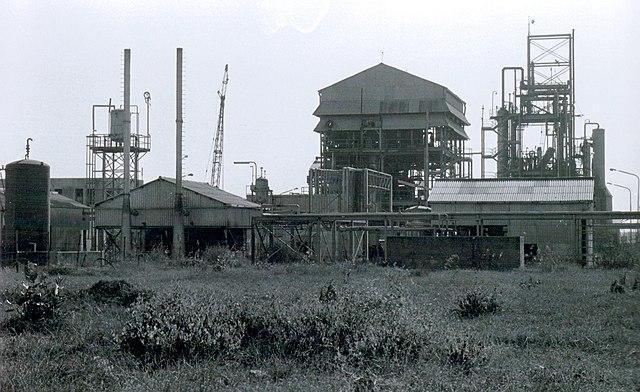Introduction
The Bhopal Gas Tragedy, also known as the Bhopal disaster, occurred on December 3, 1984 in Bhopal, India. It was a catastrophic industrial accident at the Union Carbide India Limited (UCIL) pesticide plant. The incident resulted in the deaths of at least 3,787 people and injured thousands more. It remains one of the worst industrial accidents in history and continues to have a lasting impact on the people of Bhopal and the world. The causes of the disaster were a failure in the plant’s safety systems, lack of maintenance, and poor handling of hazardous chemicals. The disaster not only resulted in immediate deaths and injuries, but also long-term health impacts on the people and environmental damage.
Background on the Union Carbide India Limited (UCIL) pesticide plant
The Union Carbide India Limited (UCIL) pesticide plant in Bhopal was established in 1969. It was a joint venture between Union Carbide Corporation (UCC), a US-based company, and various Indian investors. The plant produced a number of pesticides, including the highly toxic chemical methyl isocyanate (MIC). At the time of the disaster, the plant was not only responsible for the production of pesticides but also for the disposal of hazardous waste.
The plant was managed by a subsidiary of Union Carbide Corporation, Union Carbide India Limited (UCIL). The company was responsible for the day-to-day operations of the plant, including the maintenance and safety procedures. However, it has been reported that the safety systems in place at the plant were inadequate and not properly maintained. This lack of maintenance, along with the poor handling of hazardous chemicals, ultimately led to the disaster.
Furthermore, the company had a poor safety record, and there had been several small gas leaks in the years leading up to the disaster. These incidents had not been properly addressed, and the company had not taken any significant steps to improve safety at the plant. Union Carbide India Limited had also cut down on costs by reducing its safety staff, and the remaining staff were not properly trained to deal with an emergency of this magnitude. These factors all contributed to the tragic event that occurred on December 3, 1984.
The Disaster and its immediate aftermath
The Bhopal Gas Tragedy occurred on December 3, 1984, when a gas leak occurred at the Union Carbide India Limited (UCIL) pesticide plant in Bhopal, India. The gas leaked was methyl isocyanate (MIC) which is highly toxic and can cause severe respiratory problems. The gas leak began at around 1:00 am, and within hours, thousands of people were affected by the toxic gas. Many were asleep and had no idea what was happening, while others were trying to escape the area.
The immediate aftermath of the disaster was devastating. Thousands of people were affected by the gas leak, suffering from severe respiratory problems and burns. Many died within hours of the incident, while others died in the days and weeks that followed. The local hospitals were overwhelmed with patients, and many were treated in makeshift hospitals and on the streets. The disaster also had a severe impact on the environment, as the toxic gas killed plants and animals in the area.
Union Carbide India Limited and the local government were slow to respond to the disaster. Union Carbide initially denied responsibility for the gas leak and blamed it on sabotage. The local government was also criticized for its slow response, and for not providing adequate assistance to the affected communities. The immediate aftermath of the disaster was marked by confusion and a lack of action, which only added to the suffering of the people of Bhopal.
The Aftermath: Long-term impacts and legal proceedings
The long-term impacts of the Bhopal Gas Tragedy are still felt to this day by the people of Bhopal and the surrounding areas. Many of the survivors continue to suffer from respiratory problems, neurological disorders, and other health issues related to the exposure to the toxic gas. The environmental damage caused by the gas leak also continues to be felt, as the toxic chemicals have contaminated the soil and water in the area.
The legal proceedings against Union Carbide and its management, were prolonged and complicated. Union Carbide initially denied responsibility for the disaster and blamed it on sabotage. It took several years for the Indian government to file charges against Union Carbide and its management, and the case was further complicated by the fact that Union Carbide was a US-based company. In 1989, Union Carbide settled with the Indian government for $470 million. This amount was considered insufficient by the affected communities and survivors, who were seeking much more compensation.
The ongoing issues faced by the survivors and the affected communities include inadequate compensation, lack of access to healthcare, and the ongoing environmental contamination. The Indian government and Union Carbide have been criticized for their handling of the disaster and for their failure to adequately address the long-term impacts. Despite the efforts of the affected communities and survivors, the Bhopal Gas Tragedy remains a tragic and ongoing story of corporate negligence and government failure.
Conclusion
In conclusion, the Bhopal Gas Tragedy of 1984 remains one of the worst industrial accidents in history. It resulted in the deaths of at least 3,787 people and injured thousands more. The disaster was caused by a failure in the plant’s safety systems, lack of maintenance, and poor handling of hazardous chemicals at the Union Carbide India Limited (UCIL) pesticide plant. The immediate aftermath of the disaster was marked by confusion and a lack of action, which only added to the suffering of the people of Bhopal. The long-term impacts of the disaster continue to be felt by the survivors and the affected communities, who still struggle with health issues and environmental contamination. The legal proceedings against Union Carbide and its management were prolonged and complicated, and the compensation provided to the survivors and the affected communities is considered to be inadequate.
It is important to remember the tragic events of the Bhopal Gas Tragedy as a reminder of the importance of proper safety regulations and disaster preparedness in industrial settings. Companies must be held accountable for their actions, and governments must ensure that they enforce regulations and provide adequate assistance to the affected communities in case of a disaster. The Bhopal Gas Tragedy serves as a tragic reminder of the consequences of neglecting safety and the importance of taking proactive measures to prevent such incidents in the future.
References:
- Wikipedia Article about the Disaster: https://en.wikipedia.org/wiki/Bhopal_disaster
- Image Attribution – https://www.flickr.com/photos/44868727@N02/14119398488/


